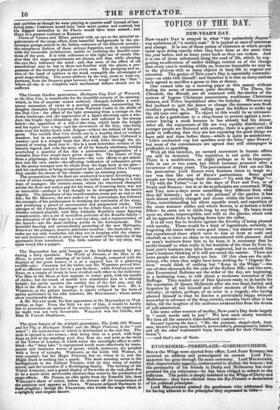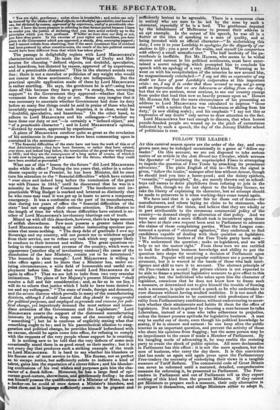ET OURDERIE—PERSIFLA GE—GOBEMOUCHERIE.
SINCE the Whigs were ejected from office, Lord Jour; RUSSELL has received an address and promulgated an answer. Lord PAL- minim:on has gone through the same ceremony. Lord MELBOURNE, with characteristic sagacity, endeavoured to decline the honour ; but the pertinacity of his friends in Derby and Melbourne has over- powered his coy reluctance—he has been obliged to submit to the infliction. The public is deeply indebted to the Whigs of Derby and Melbourne : they have elicited from the Ex-Premier a declaration of his political principles. Lord MELBOURNE praised the gentlemen who addressed him for having adhered to the principles they expressed in 1834— I be insured by the choice of defined objects, not doubtful, speculative, and hazard- "You are right, gentlemen ; union alone is irresistible; and union can only ous, but dictated by reason, approved of by experience, and of a practicable cha- rr -ter. 1 have the more pleasure in referring to that former period because I have to render you the justice of declaring that you have acted entirely up to the pr:nciples which you then professed. Whether we have done our duty or not, you have done yours. In the exercise of your rights and franchises, you have given to the Government winch you approved, a steady, firm, unvarying support ; and I cannot refrain from observing, that if the same consistent line of conduct had been pursued by other constituencies, the result of the late political contest would have been different from that which has taken place."
The passage is delightfully replete with Lord M.er-nouatin's characteristic naivete. He lauds the Whigs of Derby and Mel- bourne for choosing "defined objects, not doubtful, speculative, and hazardous, but dictated by reason, approved of by experience, and of a practicable character." This in the abstract sounds very fine : there is not a moralist or politician of any weight who would not concur in these sentiments; they are indisputable. But the practical specific application made of them by Lord MELBOURNE is rather startling. He says, the gentlemen be is add-Asing have done all this because they have given "a steady, firm, unvarying support" to the Government they approved—whether that Go- vernment have done its duty or not. Some may imagine that it was necessary to ascertain whether Government had done its duty before so many fine things could be said in praise of those who had invariably supported it : but such inquiries, it is clear, would be "doubtful, speculative, and hazardous." On the other hand, to adhere to Lord MELBOURNE and his colleagues—" whether we have done our duty or not"—is certainly a "defined object," and "of a practicable character"; and in Lord MELBOURNE'S opinion, "dictated by reason, approved by experience."
A piece of MELBOURNE candour quite as great as the revelation of his sentiments in the passage we have been commenting upon is contained in the sentence- " The financial difficulties of the state have not been the work of this or of that Administration : they have been foreseen, or rather they have existed, ever since, and indeed long before, the termination of the great war with France in 1815; and they are the consequence of a long series of events, of which it is vain now to inquire, except as a lesson for the future, whether they could have been avoided or prevented."
What use of this "lesson for the future" did Lord MELBOURNE make while in office ? During the ten years that, either in a subor- dinate capacity or as Premier, he has been Minister, did he once turn his attention to the " financial difficulties" which have existed " ever since and indeed long before the termination of the great war with France in 1815," until he discovered that he was in a minority in the House of Commons ? The incoherent and im- practicable Whig Budget is marked and lettered so distinctly that he who runs may read it was got up in haste to serve a temporary emergency. It was a confession on the part of its manufacturers, that during ten years of office the " financial difficulties of the state" had not engaged their serious attention. The allusion to the length of time for which those difficulties have existed is an- other of Lord MELBOURNE'S involuntary blurtings out of truth.
Mixed up with all this itourderie, however, there is a large amount of selfish shrewdness. Few men possess a greater talent than Lord MELBOURNE for making or rather insinuating specious pro- mises that mean nothing. "The deep debt of gratitude I owe my Sovereign and my country, will not permit me to withdraw myself from their service, nor to refuse any task which may appear likely to conduce to their interest and welfare. The great questions re- lating to the commerce and revenue of the country, which were in appearance [another slip of involuntary candour] the cause of the dissolution of the late Ministry, remain yet to be determined." The inuendo is clear enough : Lord MELBOURNE is willing to take office again ; and he hints that a Minister has, under ex- isting circumstances, a wide field of honourable and useful em- ployment before him. But what would Lord MELBOURNE do if again in office ? That we are left to infer from two very oracular intimations. The plans of her Majesty's present Ministers "shall receive a full and fair consideration ; and, as far as in me lies, I will do to others that justice which I hold to have been denied to me and my colleagues." "The state of trade, foreign and domestic, and the severe distress which prevails in many of the manufacturing districts, although I should lament that they should be exaggerated for political purposes, and employed as grounds and reasons for poli- tical change, yet imperiously demand the most serious and imme- diate attention of the Government and the Legislature." Lord MELBOURNE courts the support of the distressed manufacturing interests by professing a deep sense of the necessity of doing " something " ; but he is cautious of explicitly stating what that something ought to be ; and in his parenthetical allusion to exag- geration and political change, he provides himself beforehand with an excuse, should he again come into office, for refusing to comply with the requests of the very people whose support he is courting. It is nothing new to be told that the very defects of some men occasionally stand them in as good stead as their merits ; but it is not every day that produces such a striking example of the truth as Lord MELBOURNE. It is hard to say whether his blunders or his finesse are of most service to him. His finesse, not so perfect as to escape notice, but sufficiently subtle to indicate a kind of talent, gains him the reputation of a clever fellow; and his blunder- ing confessions of his real wishes and purposes gain him the cha- racter of a frank fellow. Moreover, he has a large fund of epi- curean good-nature, shrewdness, and gentlemanly feeling : he does not himself possess the qualifications of a Minister of State, but as a looker-on he could at once detect a Minister's blunders, and point them out in language sufficiently caustic to be piquant and sufficiently lenient to be agreeable. There is a numerous class in society who are sure to be led by the nose by such a character, especially if he is a lord. The gentleman deputed by the inhabitants of Melbourne to present their address is an apt example. In the outset of his speech, he was all in a flutter at the idea of speaking to a man of quality, and at being invested with an official character—" In undertaking this duty, I owe it to your Lordship to apologize for the disparity of our stations in life ; you a peer of the realm, and myself (in comparison with others) a small manufacturer." The half modesty of the pa- renthesis is ineffable. But Mr. HArruEs, who seems to be withal sincere and earnest in his political sentiments, must have enter- tained a secret misgiving, which prompted him to conclude his speech with an apology of a very different kind. Warming as he went on with his recapitulation of the miseries he saw around him, he magnanimously concluded—" I say not this as expressive of any doubt we have of your Lordship's cooperation at this important crisis : no, I say it in order that those around us may not go away with an impression that we are lukewarm or sliding from our duty; but that we are anxious, most anxious, to see our country emerge from under that load that now so heavily presses upon us." Honest Mr. Hersics felt that the mere circumstance of his presenting an address to Lord MELBOURNE was calculated to impress "those around" with a notion that he was "lukewarm or sliding from his duty," (a new sliding scale) ; and his emphatic "I say not this as expressive of any doubt" only serves to draw attention to the fact. Lord MELBOURNE has tact enough to discern, that when honest puzzle-headed people are wound up to the pitch of earnestness indicated by such a speech, the day of the Jeremy Diddler school. of politicians is over.
































 Previous page
Previous page